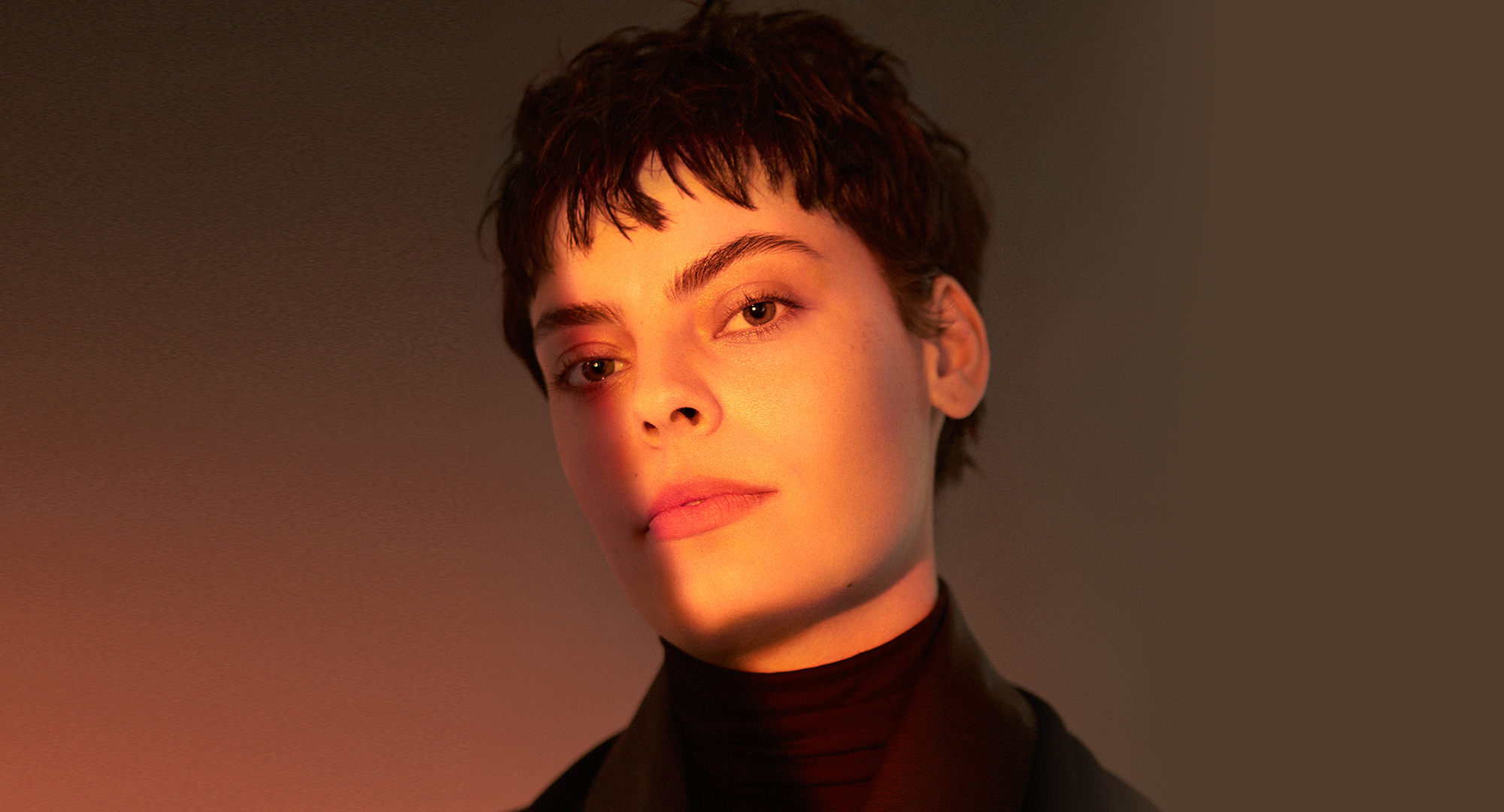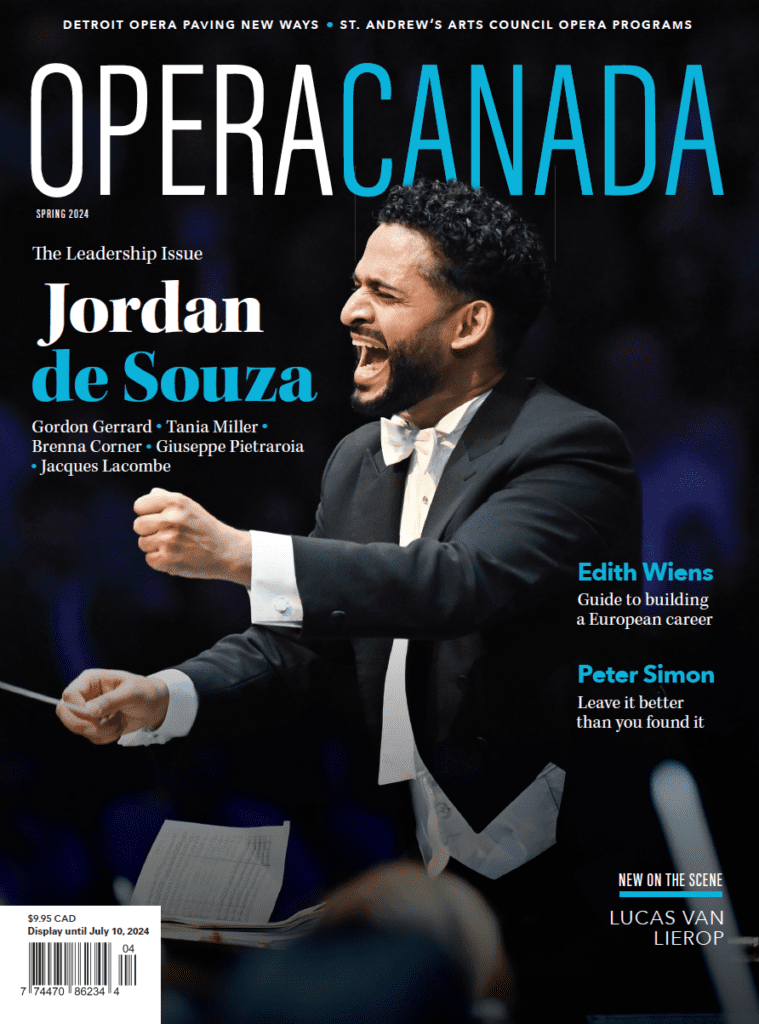Emily D’Angelo may be best known for her performances in operas of Mozart and Rossini across the stages of North America and Europe, but on her debut album with Deutsche Grammophon, enargeia, the Operalia Award-winning mezzo takes a path which embraces far older, and simultaneously newer, sounds. Released in early October, the album, recorded with das freie orchester Berlin, Dutch string quartet Matangi, and the Berlin-based Kuss Quartet, is a collection evoking the ancient Greek concept of “enargeia” which is, as the liner notes state, “the quality of extreme vividness, radiance, or present-ness.” Elegant, smart presentations of works by contemporary composers alongside Christian polymath Hildegard von Bingen (1098 to 1179) create a deeply meditative listening experience that show the true range of D’Angelo’s vocal gifts and a keen ear for programming.
Von Bingen’s compositions in particular were, for D’Angelo, “the initial kernel, the seed” of the album’s genesis. “Through reading about her and who she was and what her music meant and what music meant to her, I wasn’t sure whether it would be a medieval album – or what it would end up being – but I knew she was someone I wanted to feature. Her music has always fascinated me and I’d always been hoping for an opportunity to dig more deeply into her life and her works.” American composer Sarah Kirkland Snider (b. 1973) had been working on an opera about the German-born saint, and that project proved a starting point. D’Angelo investigated and listened to Snider’s catalogue, and “I loved it, especially her Penelope song cycle (2010). It spoke to me, and to the project, because of its connection with this ancient ancient story referencing Homer’s odyssey.”
Snider’s original work comprises four of the album’s twelve tracks; she, as well as fellow composer Missy Mazzoli (b. 1980), also provides an arrangement of Bingen’s original work. Mazzoli’s Vespers For A New Dark Age (2015), was a source of active inspiration as well. As D’Angelo explains, the work “ruminates on the question of what is the purpose of tradition, or religion in our modern world, with technology and all the goings-on of our 21st century.” The music of acclaimed Icelandic composer/producer and classically-trained cellist Hildur Guðnadóttir (b. 1982) is also featured in haunting arrangements by Berlin-based Finnish musician Jarkko Riihimäki. “The cello sort of reminds us of Hildegard von Bingen’s music, and that sound, for me, was a grounding point of the album.”
The processes of research, rearrangement, and subsequent recording “felt more like archaeology than [musical] architecture,” says D’Angelo. It was precisely that systemization which led to an intensity of focus. “In the end I didn’t want anything to be random. That was the goal: nothing here is going to be just thrown in,” she explains. “At a certain point the concept became very clear, […] and it was like, ‘okay, this is it, this is what has come through very conscious choices, artistically and musically.’” The idea, she says, is for enargeia to be experienced as a cohesive whole. “It’s something meant to be listened to as an album. I know that’s a really big ask these days when attention spans are short and playlists are more common, but the idea was to commit to creating an album which would need to be listened to all the way through.”
Recording locations, both in Berlin, were historic. The Kirche zum Heiligen Kreuze (Church of the Holy Cross), built in the late 19th century, has hosted numerous cultural events, including contemporary music festivals. The Jesus Christe Kirche (built in the early/mid 20th century), is noted for its acoustics and has accordingly hosted many historic recording sessions by classical music legends like Luciano Pavarotti, Mstislav Rostropovich, Anne-Sophie Mutter; numerous Berlin Philharmonic sessions (with conductors Wilhelm Furtwängler, Herbert von Karajan and Claudio Abbado), and the Deutsche Symphonie-Orchester with Kent Nagano. Bass baritone Thomas Quasthoff recorded his album of Bach Cantatas (Deutsche Grammophon, 2004) at the church.
“It was a conscious choice to record in these places,” D’Angelo says, “to do this studio album in a church setting, made up of very new music as well as super-old music.” That dualism creates a fascinating frisson for the listener. Blending the older concept of experiential album with contemporary sounds, placing elements of Greek mythology beside Christian ones, playing new versions of sometimes very old work (and even older stories) in settings noted for their observation of highly formalized expression, in faith as in art. Recording amidst the realities of coronavirus added yet another layer of meaning. “To be singing, alone, in a church… amidst a pandemic, where it was silent, with these very perfect recording conditions… we’d get goosebumps sometimes. Anything you create will be a reflection, or at least will be informed, by your lived experience of that moment, in that time and place.”
But D’Angelo flinches at the idea that her debut album, one exclusively featuring the work of female composers, might be construed as some sort of commentary. “It was never the statement or the intention – the first priority was always music. It was an organic process, just uncovering what it was. The music was first, always.”
The album is available now for streaming, purchase or download here.
Opera Canada depends on the generous contributions of its supporters to bring readers outstanding, in-depth coverage of opera in Canada and beyond. Please consider subscribing or donating today.






